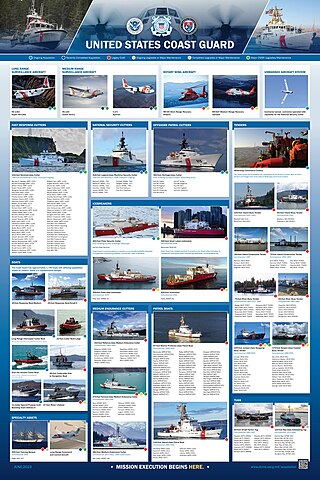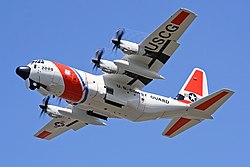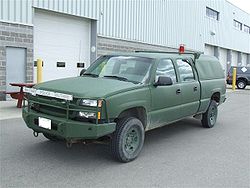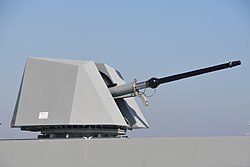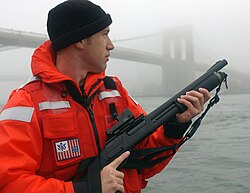Top Qs
Timeline
Chat
Perspective
List of equipment of the United States Coast Guard
From Wikipedia, the free encyclopedia
Remove ads

Watercraft
Summarize
Perspective
Cutters
Originally, the Coast Guard used the term cutter in its traditional sense, as a type of small sailing ship.[1]
Larger cutters, over 181 feet (55 m) in length, are controlled by Area Commands, the Atlantic Area or Pacific Area. Smaller cutters come under control of district commands. Cutters usually carry a motor surf boat and/or a rigid-hulled inflatable boat. Polar-class icebreakers (WAGB) carry an Arctic survey boat (ASB) and landing craft.
Any Coast Guard crew with officers or petty officers assigned has law-enforcement authority (14 USC Sec. 89) and can conduct armed boardings.
The Coast Guard operates 243 Cutters,[2] defined as any vessel more than 65 feet (20 m) long, that has a permanently assigned crew and accommodations for the extended support of that crew.[3]
Class is currently being built and currently active
Class is currently being replaced
Class is currently being built and not yet active
Boats
The Coast Guard operates about 1,402 boats, defined as any vessel less than 65 feet (20 meters) in length, which generally operate near shore and on inland waterways. The most common is 25 feet (7.6 m) long, of which the Guard has more than 350.[14] The shortest is 13 feet (4.0 m).
- USCG Auxiliary
- Auxiliary Operational Facilities: The Coast Guard surface fleet is augmented by privately owned vessels operated by the United States Coast Guard Auxiliary.
Remove ads
Aircraft
Summarize
Perspective

The Coast Guard operates about 210 aircraft. Fixed-wing aircraft, such as Lockheed HC-130 Hercules turboprops, operate from Air Stations on long-duration missions. Helicopters (Aérospatiale HH-65 Dolphin and Sikorsky HH-60J Jayhawk) operate from Air Stations, Air Facilities, and flight-deck equipped cutters, and can rescue people or intercept smuggling vessels. Some special MH- designated helicopters are armed with guns and some are equipped with armor to protect against small arms fire.
The Coast Guard was to purchase the Bell Eagle Eye UAV as part of the Deepwater program, but this has been cancelled.[30] The Coast Guard is currently preparing to launch a small UAS competition for the Legend-class NSC and future Heritage-class cutter.[31]
In addition to regular Coast Guard aircraft, privately owned general aviation aircraft are used by Coast Guard Auxiliarists for patrols and search-and-rescue missions.
Remove ads
Land vehicles
Electronic Warfare Systems
- Sea Commander Aegis derived combat system
- SCCS-Lite combat data system
- AN/SLQ-32B(V)2 Electronic Warfare System
- L-3 C4ISR suite
- AN/SPS-78 surface search and navigation radar
- AN/SPS-50 surface search radar
- AN/APX-123(V)1 IFF (ship automation provided by MTU Callosum)
Shipboard Weapon Systems
Decoys and Countermeasures
Weapons
Remove ads
Communications
Coast Guard radio stations cover a wide geographical area using very high frequency and high frequency radios. There are eight major radio stations covering long-range transmissions and an extensive network of VHF radio stations along the nation's coastline and inland rivers.
The current communication system is the Rescue 21. Rescue 21 is an advanced maritime command, control, and communications (C3) system.
The OMEGA navigation system and the LORAN-C transmitters outside the USA were run until 1994 also by the United States Coast Guard, and LORAN-C transmitters within the US were decommissioned in June 2010, with the exception of 5 CONUS LORAN-C stations that continue to be staffed due to international agreements.
Remove ads
See also
References
Wikiwand - on
Seamless Wikipedia browsing. On steroids.
Remove ads
